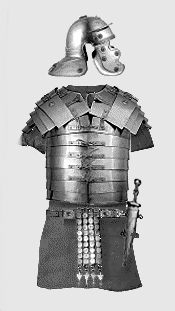
Military and Political Vocabulary of Latin Origin Inherited in Modern Romanian
The
Roman army was one of the best fighting machines known to history. Given
its equipment and exemplary discipline, it prevailed upon enemy armies,
usually less equipped and trained, conquering large and significant
territories and subduing a large number of nations.
And
so, it developed and consolidated a gigantic empire along its two thousand years of
history including inside its borders populations of
different languages and habits.
During
its long existence, the Roman army grew and suffered numerous transformations,
structuring itself on precise standards consisting in military tactics
and strategy.
A
number of words denominating parts of the Roman soldiers' equipment migrated
into the languages of the dominated nations, and suffered more
or less important transformations and are still used in what these languages
have become nowadays.
The
structure of the modern Romanian language has permitted the inclusion in
its vocabulary of a significant series of such words coming from Latin.
Some of these have perserved both their form and their meaning while others
have altered one of these components, and in some cases even both.
Cassis
- casca:
The standard steel or bronze helmet worn by almost all infantry troops
and auxilares. Is still used in Romanian under a slightly modified form
that is casca;..
Captivus
- captiv:
A person bound to work without pay; slave.
Cicatrix
- cicatrice:
A mark left on the skin or some similar tissue after a wound is healed.
It was considered in the Roman army that a soldier wearing many scars had
a greater combat experience.
Cohortis
- cohorta:
Roman army unit of 300-600 men, constituting one tenth of a legion. It
is still used in Romanian with figurative meaning to designate a large and
chaotic group; a crowd.
Militis
- militie:
In Latin it had the meaning of soldiers. When it passed into Romanian
it enriched its sense, becoming an attribute of military related notions:
militar.

Scutum
- scut:
Rectangular shield, is probably one of the most variable of the equipment
items of a Roman soldier. Its size and shape were changed throughout its
existence, but the rectangular model was probably the best, because if
more of these shields were held edge to edge they formed a testudo,
which provided armoured protection for a group of men. When the Roman soldiers
were attacking a heavily defended enemy position, or a fortified town,
they would arrange their shields to form a box which covered their heads
and all sides.
Veteranus
- veteran:
Old soldier, veteran. It's sense is unchanged.
Similar to
the army was the administrative structure, perfectly structured and
so extended and complex that it could challenge the great bureaucracies
of the present.
This system was usually enforced to the conquered nations.
Thus many terms from the political and administrative vocabulary were
transferred to the languages of those populations and they managed to remain
in their vocabulary even after the withdrawing of the administrative employees.
The
administration and the army from Dacia were withdrawn in a hurry by
Emperor Aurelian in the year 271 and moved South of the Danube, because of
the repeated harrasmentscoming from
the free Dacians and the Goths. As a testimony ofthe
continuity of the customs and of the latinity come many words preserved
from the time of the Roman domination.
Consul
- Consul:
Either of the two chief magistrates of the ancient Roman republic. Nowadays
it is a person appointed by a government to aid and serve its citizens
and business interests in a foreign city.
Dictator
- Dictator:
In ancient Rome, a magistrate with supreme authority, appointed in times
of emergency such as war. At present, ruler with absolute power, especially
one who exercises it tyrannically. It also has a figurate sense that refers
to a person who orders others about domineeringly.
Institutio
- Institut:
An organisation, society, or corporation, having a public character with
an administrative or social-cultural profile.
Lex,
legis - lege:
It keeps its original form and sense, and defines all the rules of conduct
established and enforced by the authority, legislation, or custom of a
given community, state, or other group.
Magistratus
- magistrat:
Roman officer who was elected to rule the Roman state for one year. It
now refers to a person empowered to administer the laws, such as a judge.
Plebes
- plebe:
The lower class in ancient Roman society. Free citizens but with less rights
then the patriciens. It is used now to nominate the common people, the
masses.
Respublica
- republica:
Form of organisation of the Roman State from 509 B.C to 30 B.C. . It is
supposed to be ruled by two consuls with equal rights, elected for one year.
The word has transgressed into many languages under very similar forms and means
a way of governing in which the people holding the power are elected for a limited
period of time.
Senatus
- senat:
The supreme council of ancient Rome during the Republic that later during
the Roman Empire became an advisory council with a minor political role.
In the Romanian language it is the used to name the superior chamber of the
Parliament for the states where it has two chambers.
Besides the words analized above which have a very similar form with the initial ones, a series of other words are still beeing used in the Romanian language, with some major form alteration: advocatus, - i, aparator, custo,- dis – paznic, etc.
The
existence of so many words of Latin provenience in the Romanian
vocabulary represents a hard evidence in proving its Latin origin.